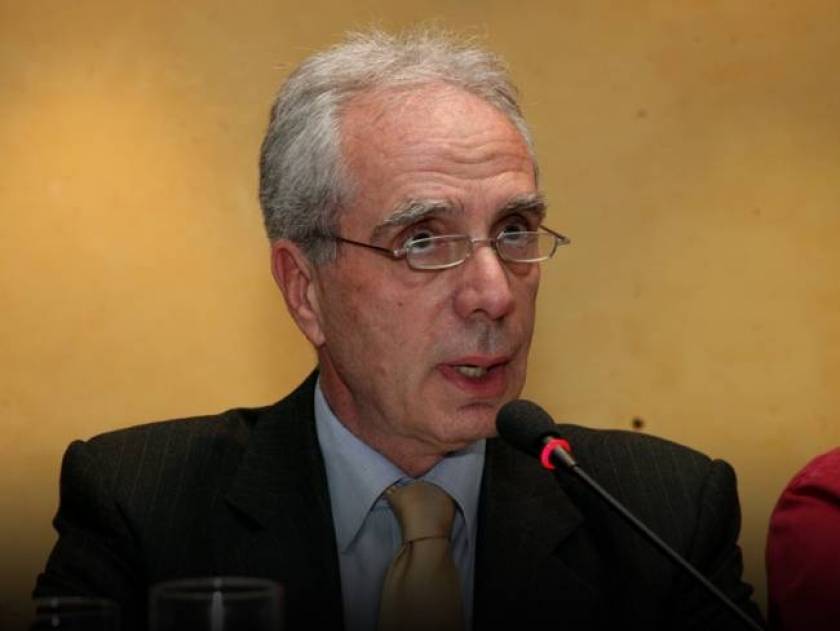K. Lourantos: Dramatic situation of the Greek pharmaceutical care

Serious allegations on the Samara's government policy in the field of pharmaceutical care, made the president of the Pan-Hellenic Pharmaceutical Association (PFS), Kostas Lourantos, at a press conference Thursday, October 23, to show the dramatic situation in health care.
Mr. Lourantos directly accused the government that it serves large financial interests and presented (with facts and evidence) the impact of the reduction in state pharmaceutical expenditure (shortages in drugs, increase in the participation of the insured, reduction in life expectancy), he reported in the rebate, the opening hours of pharmacies, and the release of the disposal of the Non Mandatory prescription drugs to the supermarkets and the medicine trafficking via the Post Office.
The pharmaceutical expenditure of 2 billion Euros in 2014, which would apply also for 2015 according to the data available so far, brings society on the verge of humanitarian crisis, said Mr. Lourantos. The social impact of the cropped pharmaceutical expenditure, which is steadily decreasing in recent years, is dramatic.
Medicines' Shortages: The problem concerns also medicines of everyday use, even in childhood vaccines, according to the president of PFS.
Large increase in financial participation for medicines and hike for the insured: In practice we are talking about doubling, even tripling of participation in some cases, supported Mr. Lourantos. In the name of increasing the availability of generics, the president of PFS referred to the difference between the prices for the insured and the retail prices, by which the insured is burdened again. He recalled the words of former Minister of Health, A. Georgiadis, "people must buy generic drugs in order to not pay hike", and Mr Lourandos disproved this assertion by presenting drugs' prescriptions that prove otherwise. If we add the 1 Euro hike per prescription paid by the insured, it becomes obvious that the reduce in public pharmaceutical expenditure burdens in its the majority the wallets of the insured.
The amount of pharmaceutical expenditure in 2 billion Euros is not realistic, since in this included the High Cost Medicines (almost 800 million Euros) and the vaccines. If we add the VAT, then, nothing is left, noted Mr. Lourandos.
"The state does not cover, not even the basic needs of the population to drugs," he said, adding that "people are forced to pay out of their wallets and pharmacists assist with huge credit, but they cannot stand anymore."
The actual amount of the pharmaceutical expenditure resulting from the data of EOPYY, which were requested from the Agency, are: For 2013 overall outpatient pharmaceutical expenditure stood at 2.53 billion Euros (private pharmacies, pharmacies EOPYY, claw back of companies, rebate of pharmacies). Already in the first half of this year, pharmaceutical expenditure has reached 1.127 billion Euros.
Regarding the issue of opening hours of pharmacies, Mr. Lourantos said that this is one of the biggest "thorns" for the pharmacies. "We want organization and order rather than chaos and mess, as there is today since whoever wants opens and closes at will", he said and referred to the problems raised in the nights of duty and the decontrol of opening hours of pharmacies.
Also, addressing the question of disposal of non prescription drugs on supermarkets, explained that this is not about drugs that indemnified by the insurance funds, that have potential side effects and should be handled only by health professionals (pharmacists and in exceptional cases by physicians) as required by law and the relevant EU Directive.
In connection with the above matter, he spoke about the delivery of medicines from the Post Office, highlighting the risks to public health. "Who will do the updating for participation and the prices of medicines, or will sign for the option of more expensive drug, the postman?" He wondered. He also brought as an example for the specific storage conditions of medicines, the need for thermometers to the vehicles transporting pharmaceuticals.
"I ask the government, what do you finally want; to serve the citizen or the large economic interests that you serve? To support primary health care or the shelves of the supermarkets, that you serve? To have pharmacies and pharmaceutical care throughout the country or only in the centers and main streets of the big cities?" These were some of the questions raised by Mr. Lourantos.
Finally, he noted the correlation of life expectancy to the level of pharmaceutical expenditure and thus the level of pharmaceutical care. A pharmaceutical expenditure which does not cover the needs of the Greek people means a deterioration in life expectancy and a State that does not respect its citizens.













